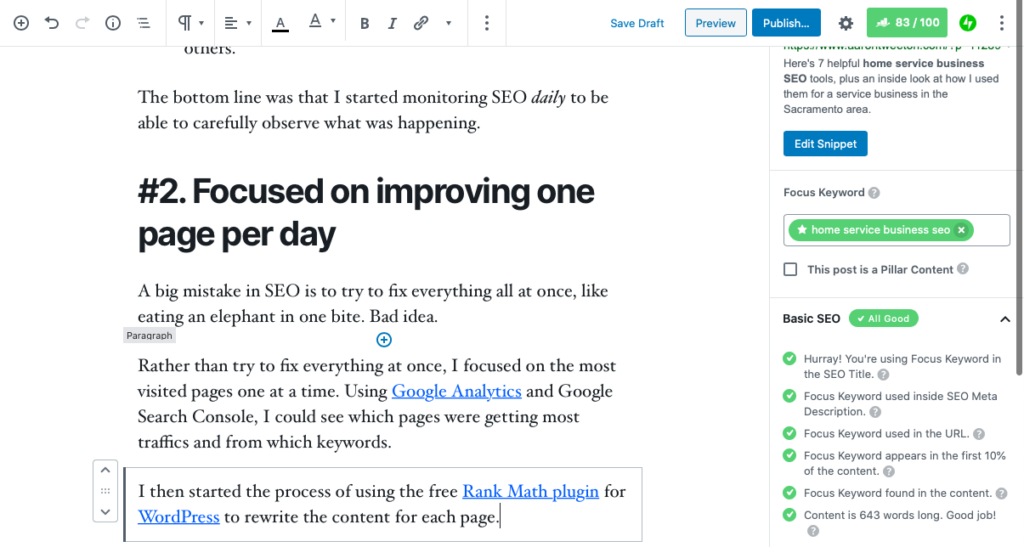Search engine optimization, or SEO, is a great way to improve your website so you can reach more customers.
However, I tend to cringe whenever someone starts talking about SEO, because I’m waiting to hear the advertisement of shady tactics and bad practices.
There’s are ethical and easy-to-understand ways to integrate SEO for into your home service business. I’m going to share what I did for a home service business in the Sacramento area, plus the tools you can use for improving your home service business SEO.
Want to jump to the tools?
I’m not an home service business SEO expert
Let me make something clear — I don’t claim to be an SEO “expert”. The more I learn about optimizing content for search engines, the more I know that I’ve only scratched the surface.
If you’re getting started with small business SEO, I recommend watching the following channels on YouTube:
If you’re really serious about SEO, LinkedIn Learning has great courses on SEO as well.
Now, here’s what I did to improve SEO for a small business.
What I did to improve SEO for a home service company
#1. Perform a daily audit
Auditing your site using an SEO tool is the first step toward improving your home service business SEO. I started auditing using these three tools:
- UberSuggest: This free tool by Neil Patel gives you a great overview of your site’s top SEO pages, keyword suggestions, content ideas, plus a look at how you compare with the competition.
- Google Search Console: This free tool lets you see which keywords are bringing visitors to your website, plus some other features.
- ManageWP: This paid tool will monitor keywords and send you reports on how your site ranks in comparison to others.
The bottom line was that I started monitoring SEO daily to be able to carefully observe what was happening.
#2. Focus on improving one page per day
A big mistake in SEO is to try to fix everything all at once, like eating an elephant in one bite. Bad idea.
Rather than try to fix everything at once, I focused on the most visited pages one at a time. Using Google Analytics and Google Search Console, I could see which pages were getting most traffics and from which keywords.
I then started the process of using the free Rank Math plugin for WordPress to rewrite the content for each page.

#3. Use keywords for developing new content
After auditing and optimizing the existing pages, I conducted some keyword research using to determine what future content should be created as blog posts.
Home service businesses face a challenge where they’re trying to rank high for a specific service, but also rank high for a specific service area. A page that ranks well for “Folsom gutter cleaning” may not rank well for “Sacramento gutter cleaning” and vice versa.
Some businesses and SEO experts recommend ranking for different service area by duplicating content and just changing the service area name.
An alternative is to create a blog post with original content that’s less likely to get penalized for duplication. This blog post can be customized for the particular season, be written to address frequently asked questions, and more easy shared.
You can read more about the issues of duplicate content here: https://moz.com/learn/seo/duplicate-content
Tools for improving home service business SEO
Okay, here’s a list of the tools again, I’ve used and continue to use for SEO.
- RankMath SEO Analyzer: An analysis tool provided by Rank Math, an alternative to Yoast SEO.
- UberSuggest: Neil Patel’s uber-terrific free tool for auditing your site or spying on a competitor.
- Google Trends: a great tool for comparing keywords and trends.
- Google Search Console: a must for seeing Search queries for your site, along other features.
- SpyFu and Moz: similar tools for checking out your own site and comparing with others in regards to SEO.
- WordTracker: Another useful keyword research tool.
- Google Analytics: a must for any website, unless you go with an alternative analytics service.
- Answer The Public: a great resource for getting keyword content creation ideas.
